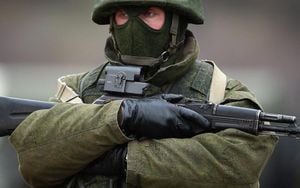Indonesia and Russia made headlines recently as their navies embarked on their first-ever joint military exercises, marking significant strides toward strengthening ties between the two nations. Beginning on November 4 and running through November 8, 2024, these exercises take place primarily in the Java Sea, near Surabaya, Indonesia's second-largest city. This collaboration not only showcases Indonesia's growing military diplomacy but also signals potential shifts under newly inaugurated President Prabowo Subianto—a figure eager to reshape the nation's foreign relations.
The drills involve several Russian naval vessels, including three corvette-class warships, which arrived accompanied by a medium tanker, military helicopter, and tugboat. Indonesian Navy spokesperson I Made Wira Hady Arsanta Wardhana emphasized the significance of having Russian warships conduct joint drills for the first time, reinforcing diplomatic relationships aimed at enhancing military capabilities. Both sides view this collaboration as an opportunity for mutual knowledge exchange, fostering expertise on various maritime strategies, operational practices, and technology.
These exercises hold great relevance as they occur against the backdrop of Indonesia's long-standing non-alignment policy. Traditionally, Indonesia has maintained neutrality, refraining from taking sides amid rising geopolitical tensions, particularly related to the Ukraine conflict and the rivalry between the United States and China. This stance aligns with Prabowo's vision to pursue cooperative relationships with multiple global partners without committing to any one bloc.
Analysts see these naval drills as the beginning of Prabowo Subianto's administration actively seeking partnerships with major powers. His administration clearly intends to broaden Indonesia's connections, reflected in his prior meetings with Russian President Vladimir Putin, where he labeled Russia as "a great friend." There was also mention of reactivatiing stalled trade deals, such as the $1.1 billion agreement for Russian fighter jets—a move deemed controversial by the West and potentially subject to U.S. sanctions.
During his presidential election campaign, Prabowo emphasized the potential benefits of stronger military collaboration with Russia, highlighting this as part of Indonesia's broader objective to secure autonomy and greater alternatives for international interaction. Such statements come at a time when Indonesia looks to balance its relationships with superpowers and improve its military position within Southeast Asia.
D.W. Asia-Pacific Bureau Chief Georg Matthes adds another layer, noting the importance of Indonesia maintaining its neutral stance. The planned drills, he pointed out, do not indicate Indonesia's unwavering alignment with Russia; rather, they are merely one facet of its multifaceted military engagements. Matthes recalled the recent naval exercises held with German vessels and the long-standing annual "Super Garuda Shield" exercises conducted with the United States since 2006, featuring over 4,500 personnel this past year.
Critics, including international relations professors like Yohanes Sulaiman, stress the need for clarity around Prabowo's foreign policy ambitions. While the exercises may showcase the willingness of Indonesia to collaborate broadly, questions remain about the overarching strategic direction and how these drills will fit within Indonesia's existing military engagements with other nations.
Back home, local broadcasters provided compelling coverage, featuring Russian naval ships being welcomed with traditional Indonesian festivities, reflecting the ceremonial importance of these exercises. This provides not only military significance but also cultural exchanges, enhancing goodwill between the nations.
Russia's Ambassador to Indonesia, Sergey Tolchenov, also described these drills as the "first large-scale naval exercises of Russia and Indonesia," adding weight to this pivotal moment for both nations. He underlined the significance of fostering relationships through military communication and cooperation, reinforcing Russia's desire to demonstrate its relevance on the global stage—even among nations traditionally aligned with Western powers.
Analysts have noted the geostrategic advantages for Indonesia amid the fluctuative dynamics of South East Asia. The Indonesian military seeks to benefit from diverse partnerships to navigate the intricacies of regional security challenges effectively. By engaging with Russia, Indonesia positions itself as an active middle power capable of forging various alliances.
This innovative approach to foreign policy echoes the broader motives behind the exercises—the intention to diversify Indonesia's global partnerships, safeguard national interests, and perhaps emerge as more than just a spectator amid great power rivalries. Increasingly, Jakarta is taking proactive steps toward security autonomy and economic independence.
While joint military exercises may raise eyebrows amid increasing tensions globally, the Indonesian-Russian collaboration exemplifies the complexity of modern diplomacy, where nations increasingly seek collaborations on shared interests to bolster collective security. The next five days are just the beginning of what many expect to be more prominent partnerships moving forward.



